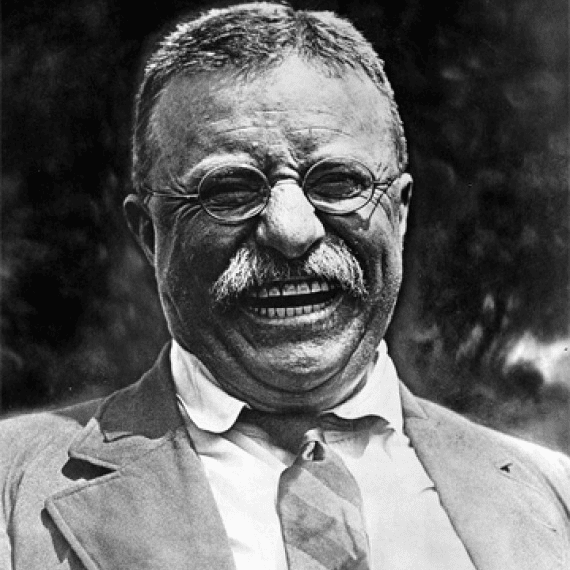Presidential Address
In Memoriam
From the American Historical Review 24:3 (April 1919)
Theodore Roosevelt (October 27, 1858–January 6, 1919). In what is said in these pages concerning historians who have died during the preceding quarter, it is customary and natural to dwell rather upon their achievements and qualities as historians than upon any relation they may have had to the public life of the time. In the case of Theodore Roosevelt, however, who died on January 6, having been President of the United States from 1901 to 1909, and president of the American Historical Association in 1912, to confine attention to his historical writings appears hardly appropriate, not only because it might seem to belittle a great public career, but also because the traits which gave eminence to his historical writings were largely the same as those which marked his character as a public man. The History of the Naval War of 1812 (1882) which he wrote in his youth had its part in forming the Assistant Secretary of the Navy. His Gouverneur Morris and his Benton were the work of a mind appreciative and sympathetic toward both the cultivated, Europeanized politician of the old school and the aggressive ultra-American of the new West. The admirable address on “History as Literature,” which he read as president of the American Historical Association, while setting forth his general views as to the writing of history, exhibits also the astonishing range and versatility of mind that made him so supremely interesting a figure in the great world. The Winning of the West (1889–1896), his chief historical work, was marked by the same qualities of vigor and breadth and sympathy with the average active American, which characterized his public life. In that remarkable work, of which any professional historian might be proud but which no one could have achieved who had not the highest traits of the amateur spirit, he views the settlement of the West, not as primarily an economic process, but rather as a manifestation of that romantic energy which so filled his own mind and character. From that romantic energy sprang the graphic vigor he applied to the many picturesque aspects and episodes of his theme. Its legal aspects and the development of institutions were, like economics, secondary in his thought. Its moral aspects, on the other hand, interested him in the highest degree. The westward advance presented itself to his mind chiefly as a product of robust American character. He depicted the nation’s conquest of the wilderness with the same manly and patriotic, almost chauvinistic gusto that he brought later to the conduct of its affairs, and that made his voice, despite some false notes, a trumpet-call to his generation.
Bibliography
Essays on practical politics, by Theodore Roosevelt. New York & London: G.P. Putnam’s Sons, 1888.
A colonial survival, by Theodore Roosevelt. Rochester, N.Y.: Schlicht & Field, 1892.
African game trails: an account of the wanderings of an American hunter-naturalist, by Theodore Roosevelt. New York: C. Scribner’s Sons, 1910; Reprint with new introduction by H.W. Brands, with more than two hundred illustrations from photographs by Kermit Roosevelt and other members of the expedition and from drawings by Philip R. Goodwin. New York: Cooper Square Press, 2001.
New York, by Theodore Roosevelt. New ed. with postscript, 1890-1895. New York, London: Longmans, Green., 1895.
American ideals, and other essays, social and political, by Theodore Roosevelt. New York, London: G. P. Putnam’s Sons, 1897.
The Rough Riders, by Theodore Roosevelt. New York, C. Scribner’s Sons, 1899; Reprint with an introduction by Edmund Morris. Modern Library paperback ed. New York: Modern Library, 1999.
Oliver Cromwell, by Theodore Roosevelt. New York: C. Scribner’s Sons, 1900.
The strenuous life; essays and addresses, by Theodore Roosevelt. New York: Century Co., 1900; Reprint, St. Clair Shores, Mich., Scholarly Press, 1970.
The wilderness hunter; an account of the big game of the United States and its chase with horse, hound, and rifle, by Theodore Roosevelt. New York, London: G. P. Putnam’s Sons, 1900.
The winning of the West, by Theodore Roosevelt. 6 vols. New York and London: G.P. Putnam’s Sons, 1900; Reprint, 4 vols. Lincoln: University of Nebraska Press, 1995.
Hero tales from American history, by Henry Cabot Lodge and Theodore Roosevelt. New York: Century Co., 1895; Reprint, Hero tales: how common lives reveal the uncommon genius of America, with an introduction by George Grant. Nashville, Tenn.: Cumberland House, 2000.
The naval operations of the war between Great Britain and the United States, 1812-1815, by Theodore Roosevelt. Boston, Little, Brown, 1901.
Thomas Hart Benton, by Theodore Roosevelt. Boston, New York: Houghton, Mifflin, 1903.
Hunting the grisly, and other sketches; by Theodore Roosevelt. New York: Review of Reviews, 1904.
The naval war of 1812; the history of the United States navy during the last war with Great Britain, to which is appended an account of the battle of New Orleans, by Theodore Roosevelt. 2 vols. New York: Review of Reviews, 1904; Reprint with an introduction by H.W. Brands. New York: Da Capo Press, 1999.
A square deal, by Theodore Roosevelt. Allendale, N.J.: Allendale Press, 1906.
Abraham Lincoln, by Theodore Roosevelt. New York: Collier’s, 1909.
The new nationalism, by Theodore Roosevelt; with an introduction by Ernest Hamlin Abbott. New York: Outlook, 1910.
America and the World War, by Theodore Roosevelt. New York: C. Scribner’s Sons, 1915.
Why America should join the allies, by Theodore Roosevelt. London: C. A. Pearson, 1915.
Theodore Roosevelt, an autobiography. New York: Macmillan, 1916; Reprint, with a new introduction by Elting Morison. New York: Da Capo Press, 1985.
The man in the arena: the selected writings of Theodore Roosevelt, a reader. Edited by Brian M. Thomsen. 1st ed. New York: Forge, 2003.
